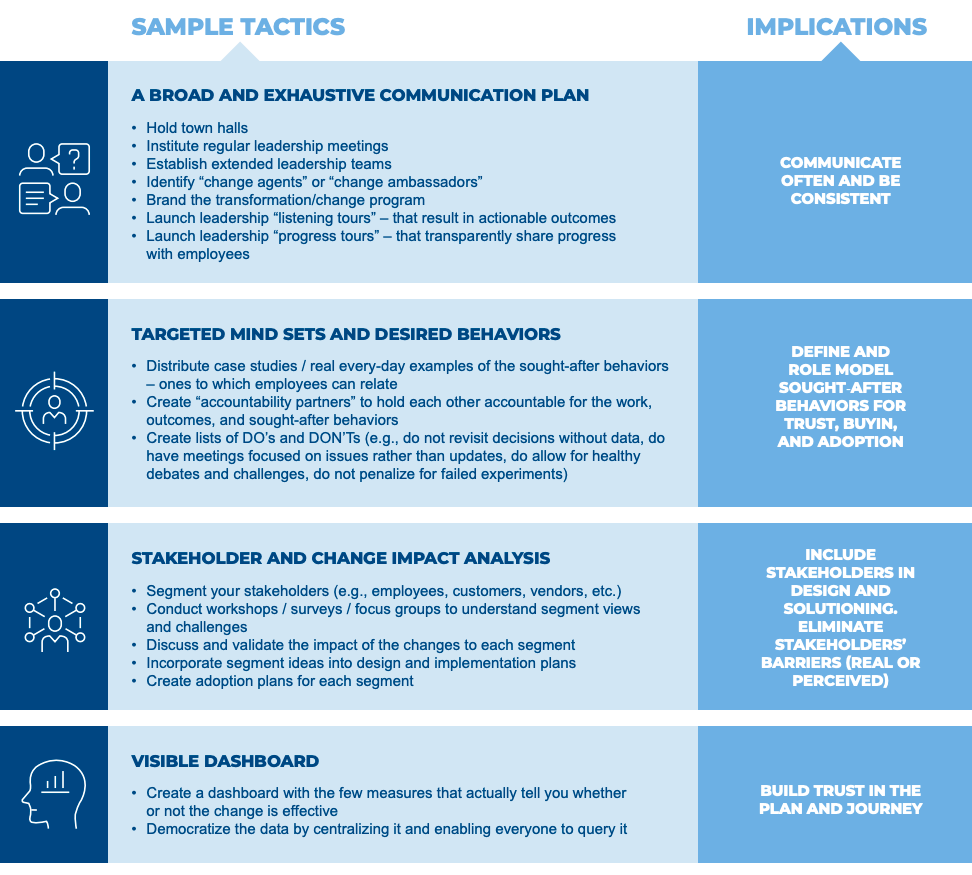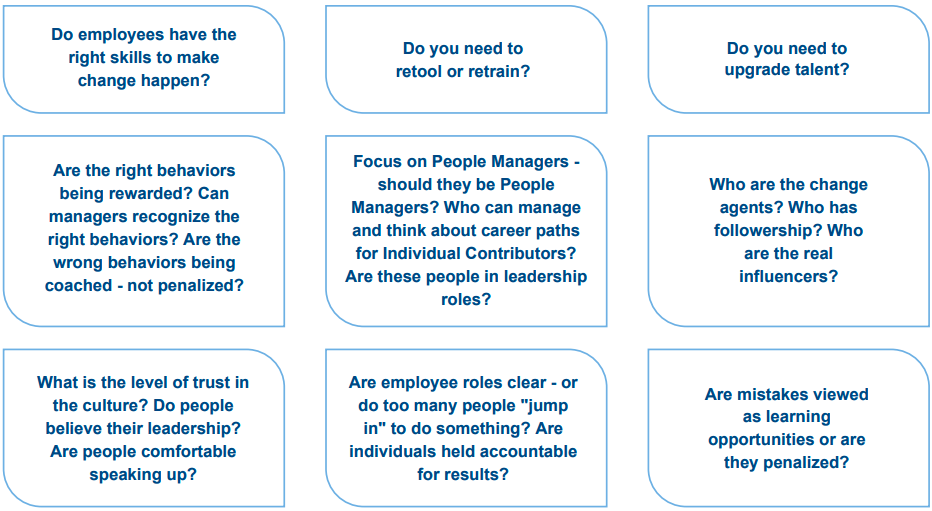
The Importance of Culture in Change Management
February 2020
Straight To The Point
In today’s world, the rapid pace of change necessitates that organizations evolve constantly. Organizational transformation typically focuses on cost cutting initiatives; however, transformation value can also come from growth initiatives - which can be equally as transformative, if not more so. Unfortunately, about three quarters of corporate transformations fail, mainly due to “human issues” or “culture issues”. Companies with a healthy culture consistently outperform their peers, as the success of any business transformation is predetermined by effective staff engagement.
Key Factors for Successful Transformations
Implementing Change Management Discipline that Understands the Impact on the “People Side of Change”
A Simple and Clear Statement of Where You Are Going
- Define what success will look like when achieved: If you do not know what you want to transform into, how can you motivate others to go along with you for the ride?
- Create a simple narrative for the case for change: If you cannot explain where you are going (and WHY) in simple terms, how will stakeholders (employees, customers, vendors) understand what you want to achieve?
- Take an investors’ perspective on where the value might be - and be specific about outcomes /targets: How can you create momentum if you do not have evidence of progress or success?
A Clear Rationale for Why the Change Is Necessary – With a Sense of Urgency
- Align the rationale for change to day-to-day activities: Especially critical for employees, the change must mean something to them; else they will resist.
- Create a sense of urgency: Help stakeholders to understand the risks and impact of not changing.
A Committed and Aligned Leadership Team
- Serve as a role model for change in mindsets and behaviors: Employees should see desired behaviors in action by their leaders; they will not trust in the change if the leadership team does not “walk the walk” or “talk the talk”.
- Eliminate hidden agendas: Employees easily identify hidden agendas – so eliminate any to build trust in a shared agenda.
An Honest Understanding of Where You Are Today
- Understand your current state: How do you know how far or how big your journey is or needs to be if you do not know your starting point?
- Be honest: Honesty is the best policy…and while it may hurt, it is better to be frank about where you are now and where you need to be.
A Framework and Clear Criteria for Prioritization
- Focus on a few things – and do them well and finish them: Not everything can be a top priority; making all things equally important will result in slow or minimal progress. Prioritize the work - and mean it!
- Demonstrably STOP doing things: It is amazing how good and motivational this will feel - to everyone.
- BUT adapt along the way: Change direction or adapt as you learn about yourself, the market, your customers, or from your failures. Be open to learning from your mistakes.
A Sense of How Success and Change Will Be Measured (Metrics / Dashboard)
- Develop the right metrics: Tie them back to the definition of success and the value to be delivered by the change. Consistency with your simple story breeds trust and helps with maintaining momentum.
- Keep the metrics to a small number: Ensure to include measures for adoption; if you build it, will they come?
- Celebrate progress and failures: Support and maintain momentum...change is hard. Celebrating failures demonstrates a learning environment and transparency - which supports a culture of “we are all in this together".
Critical Elements of an Approach to Change Management
Support your change with a thoughtful approach to change management and culture, keeping in mind the people implications.

Questions to Consider when Assessing Readiness to Change
Understand your culture, talent, and the supporting people, systems, and processes.

Key Actions
- Define and develop processes and systems that will reinforce the behaviors sought after
- Define and provide examples of the behaviors that are sought to a) make the change happen, and b) enable and sustain the new, transformed entity
Table of Contents
About Reference Point
Reference Point is a strategy, management, and technology consulting firm focused on delivering impactful solutions for the financial services industry. We combine proven experience and practical experience in a unique consulting model to give clients superior quality and superior value. Our engagements are led by former industry executives, supported by top-tier consultants. We partner with our clients to assess challenges and opportunities, create practical strategies, and implement new solutions to drive measurable value for them and their organizations.